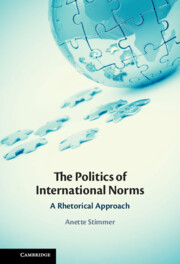Book contents
- The Politics of International Norms
- The Politics of International Norms
- Copyright page
- Dedication
- Contents
- Figures
- Tables
- Acknowledgments
- Abbreviations
- Introduction
- 1 Alternate Endings of Norm Contestation
- 2 Persistence of Alternate Endings
- 3 Norm Impasse
- 4 Norm Neglect
- 5 Norm Recognition
- 6 Norm Clarification
- Conclusion
- Bibliography
- Index
1 - Alternate Endings of Norm Contestation
Published online by Cambridge University Press: 07 February 2025
- The Politics of International Norms
- The Politics of International Norms
- Copyright page
- Dedication
- Contents
- Figures
- Tables
- Acknowledgments
- Abbreviations
- Introduction
- 1 Alternate Endings of Norm Contestation
- 2 Persistence of Alternate Endings
- 3 Norm Impasse
- 4 Norm Neglect
- 5 Norm Recognition
- 6 Norm Clarification
- Conclusion
- Bibliography
- Index
Summary
This chapter focuses on the "alternate endings" typology. Building on theories of political rhetoric, we can break norms down into norm frames (norm-based justifications) and behavioral claims (conclusions for actions) and identify four alternate endings of norm contestation: norm impasse, norm neglect, norm recognition and norm clarification. Whether states (dis)agree on frames, claims, or both affects the stability of these alternate endings and norm strength. As identifying frames and claims in actors’ interpretations of international law is the cornerstone of this book, this chapter first provides detailed guidance on different kinds of norm frame and claim disagreements. It then analyzes the relative stability of each "alternate ending" and shows that frame agreement is an internal source of stability. Norm strength is conceptualized as the extent of collective expectations related to applying a norm of international law in a certain way. Norms are stronger when these collective expectations are clearer (social norm strength), and are held by more (critical) actors and/or cover more situations (relative norm strength). The chapter shows that the "alternate endings" typology can anchor the assessment of how contestation affects collective expectations. This approach provides a more actor-centric assessment of norm strength, compared to other prominent approaches.
Keywords
- Type
- Chapter
- Information
- The Politics of International Norms , pp. 38 - 77Publisher: Cambridge University PressPrint publication year: 2025

